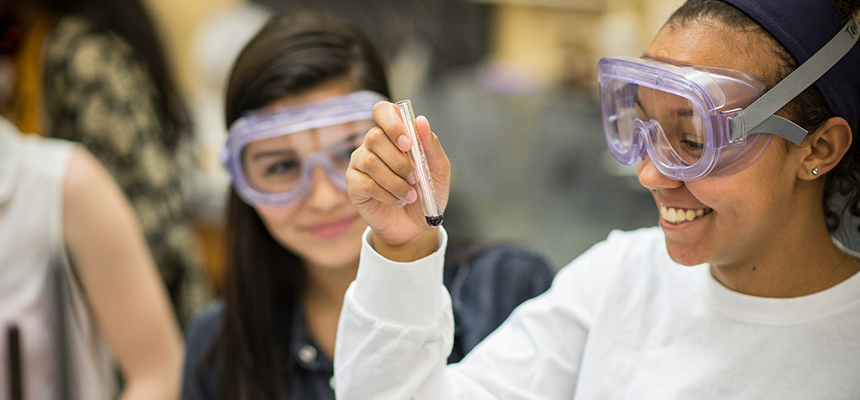Chemistry Department
The bachelor's degree in Radiological Sciences at NDMU prepares effective health care leaders committed to providing the best care. Our program pairs the deep understanding of the sciences required for clinical education with the universal skills often sought by employers including critical thinking, strong communication, and ethical decision-making. Whether you are an entry-level student or a professional already working in the field, our program prepares well-rounded leaders equipped to care for diverse patient populations.

The Radiological Sciences Program at NDMU
Notre Dame offers two ways to pursue a Bachelor of Science in Radiological Sciences:
- Traditional full-time program through the Undergraduate Studies
- Part-time bachelor's degree completion program for radiological sciences professionals
Program Partners
Our partnerships provide a pathway for Undergraduate Studies students to complete the clinical training requirements pending successful application.
We also offer as a smooth transfer process for working adult learners completing a bachelor's degree.
Admissions Information
Admission to clinical certification programs is highly competitive and acceptance can not be guaranteed. It is important to thoroughly understand the admissions criteria for your clinical program of interest and regularly confer with the program coordinator as you prepare for clinical study.
Undergraduate Students
How It Works
- Complete all requisite general education, mathematics, and science courses at Notre Dame.
- Complete academic courses in aa concentration of Business, Spanish, Biochemistry or Physics.
- Apply to a full time clinical program with one of our program partners in the fall semester prior to the start of the program.
- Complete all requirements of the clinical certification program.
- Pass the national registry exam to become a licensed medical imaging technologist.
Sample Program of Study
This is a sample program of study for radiological sciences majors in the Undergraduate Studies prior to clinical training (required for Radiography, recommended for all modalities). Students should select courses with the assistance of the program coordinator.
| Fall/Winterim |
Spring |
First Year
|
| BIO 111 |
4 |
LCL 333 |
3 |
| ENG 101 |
3 |
MAT 215 |
3 |
| PSY 101 |
4 |
NDMU 100/L |
2 |
| NDMU 100/L |
2 |
Phil 201 |
3 |
| COM 106 |
3 |
CHM 108 |
4 |
| [16 credits] |
|
[15 credits]
|
|
Second Year
|
| AnP 1 |
4 |
AnP 2 |
4 |
| Phil 339 |
3 |
MAT 107 |
3 |
| LSP 101 |
3 |
LSP 102 |
3 |
| Concentration |
3 |
Concentration |
3 |
| AE/IC/EC/Div |
3 |
PED |
1 |
| |
|
AE/IC/EC/Div |
3 |
| [16 credits] |
|
[17 credits] |
|
Third Year
|
| Phy 1 |
4 |
AE/IC/EC/Div |
3 |
| AE/IC/EC/Div |
3 |
RST 105 |
3 |
| CST 130/141 |
3 |
Concentration |
3 |
| Concentration |
3 |
Concentration |
3 |
| Concentration |
3 |
Concentration |
3 |
| |
|
|
|
| [16 credits] |
|
[15 credits] |
|
Adult Undergraduate Students
Most working professional with a license can complete academic courses in a concentration of Business, Spanish, Biochemistry or Physics.
Please contact a transfer professional to complete the course requirements.
http://catalog.ndm.edu/undergraduate-catalog/school-of-arts-and-sciences/radiological-sciences
Professional Training
For the professional training portion of the degree, first choose (1) clinical concentration.
Clinical Concentrations
- Radiography
- Nuclear Medicine Technology
- Diagnostic Medical Sonography
Note: Certified technologists who have completed a clinical training program will be awarded a block of credits toward the degree.
Radiological Sciences Careers
Driven by an aging population and advances in technology, there is a great demand for professionals in this field.
Once you complete all academic and clinical programs, you are qualified to become a licensed medical imaging technologist by passing the national registry exam.
Career Opportunities
- Ultrasound Technologist
- Nuclear Medicine Technologist
- Magnetic Resonance Imaging technologist
- Interventional Cardiovascular technologist
Program Contacts:
Dr. Brian Christy, PhD
Associate Professor Knott Science Center (KNO) 311
bchristy@ndm.edu
Ms. Erika Rushanan, MAT
Academic Advisor Caroline Hall (CHL) 423
erushanan@ndm.edu
410-532-5503
Dr. Brian Christy and Ms. Erika Rushanan employ a collaborative advising approach. When unsure of who to email, it's recommended best practice to email them both for a timely response to your inquiry.


